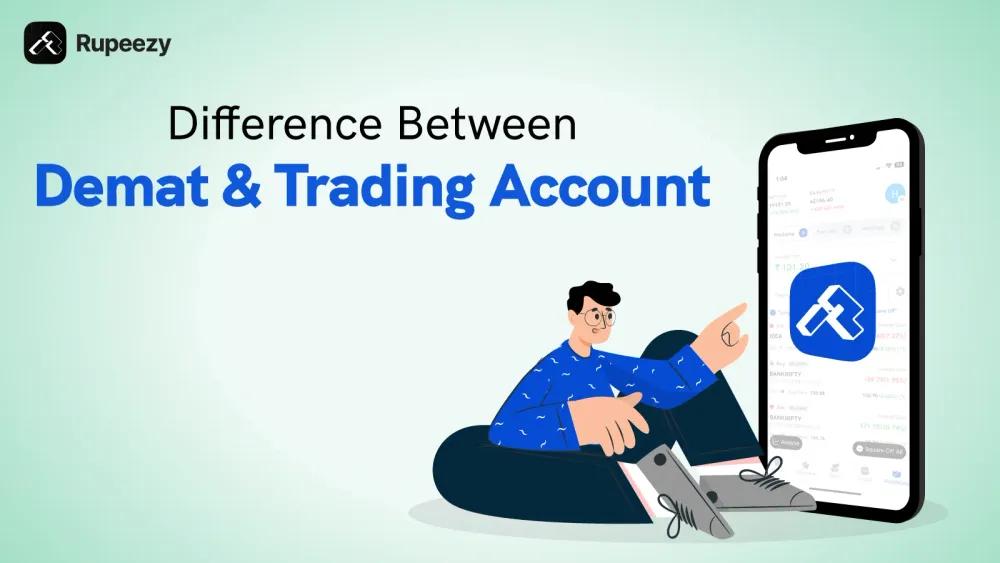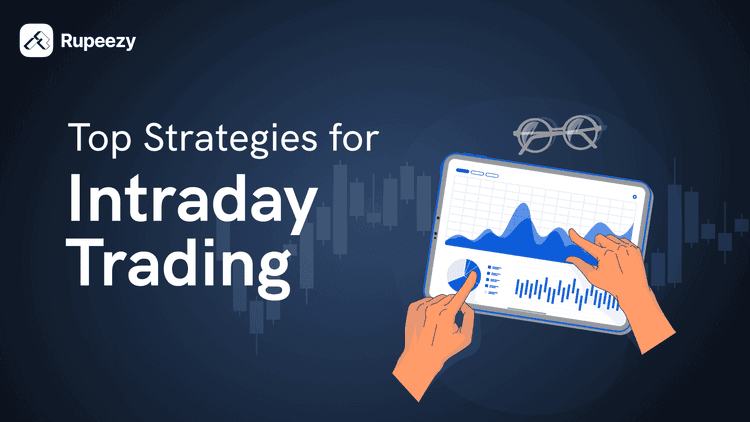Difference Between Demat and Trading Accounts


00:00 / 00:00
Demat and Trading Accounts are important tools for investors in the stock market and other investment sectors. If you are a beginner in investing, understanding the objectives and differences between demat and trading accounts is crucial for guiding you on your investment journey. This article provides insight into what the trading account and demat account mean, their advantages, how they differ, who can open them, and other aspects to enable you to make accurate decisions.
What is a Demat and Trading Account
Demat Account
A Demat Account is a type of account that holds financial securities like stocks, bonds, mutual funds, etc., in an electronic format. It removes the requirement for using physical certificates thereby making it a convenient and secure platform for investors.
With a Demat account, one can transfer shares and securities promptly. As the trades get executed, these shares will transferred electronically to their demat account.
When you want to buy a stock you can place a buy order and the shares will be credited to your demat account. In the same way, if you wish to sell the shares, they debit the shares from your demat account.
Trading Account
A trading account is an account through which investors can buy and sell financial instruments such as stocks, bonds, commodities, and more. It is usually connected to a demat account where acquired securities are kept electronically, and to a bank account for money transfer.
A trading account acts as the essential link between an investor’s demat account, bank account, and the stock market. It facilitates the buying and selling of shares. If you wish to trade in equity shares, having a trading account is mandatory which is opened along with the demat account.
In simple words, It is an online brokerage account that enables a user to buy and sell securities in the stock market. It serves as a connection between the investor and the stock exchange for executing trade orders.
Benefits of Demat Account vs Trading Account
Benefits of Demat Account
Safe Storage: Electronic format makes sure that your securities are stored securely and easily accessible. As in the case of physical shares, they are always associated with the risk and hassle of safekeeping the shares.
Reduces Risk: Since the securities are held in the Demat account electronically one doesn’t have to worry about losing or damaging physical certificates anymore.
Easy Transfer: Transferring shares like buy and sell between accounts can be done quickly and easily. The Demat account enables the holders to hold any number of shares, monitor the shares regularly, and also caters to easy transfer of shares online.
Easy access Points: One can access their Demat account anytime and anywhere using their login credentials on mobile, tablet, PC, laptop, etc.
Benefits of Trading Account
Seamless Trading: This lets you buy and sell stocks, derivatives, commodities, and other things. It facilitates a seamless platform to easily purchase or sell financial instruments.
Access to Various Exchanges: A trading account allows the traders to buy and sell items across various markets and exchanges like, NSE, BSE, Futures and Options, Commodities, Currency, and many more.
Flexibility: Online trading has introduced the flexibility to keep track of investments from anywhere and at any point in time.
Real-Time Market Data: A trading account facilitates traders with real-time information and data on the market to make accurate and informed decisions.
Difference Between Demat and Trading Account
The main difference between a Demat account and a trading account is that a Demat account stores shares and securities in digital form, while a trading account is used to buy and sell those securities on the stock exchange. Other differences include charges, issuing entities, and other aspects mentioned below.
Particulars | Demat Account | Trading Account |
Definition | A Demat account is a digital account that enables investors to store shares and other securities electronically. | A Trading account is a digital account that enables investors to purchase and sell shares and other securities on the exchanges. |
Role | The primary role of a Demat account is to store securities electronically to prevent theft, loss, or damage. | The role of a Trading account is to facilitate the placement of buy and sell orders on exchanges. |
Issuing Entity | A Demat account is issued by a depository through a Depository Participant (DP). | A Trading account is provided by a SEBI-registered stockbroker. |
Unique Identifier | Every Demat account has a unique 16-digit number for easy identification. | Every Trading account has a unique trading ID or number, depending on the stockbroker. |
Charges | Fees include Account Maintenance Charges (AMC) and transaction fees, among others. | Usually, no charges for the account itself, but brokerage charges apply for trades executed through the account. |
Purpose | Primarily used for holding and storing securities in electronic form, ensuring safekeeping and easy transfer of securities. | Used for executing buy and sell orders in the stock market. |
Transactions | Records the holdings and movements of securities. | Records the buying and selling transactions. |
Interface | Accessed through the online portal or mobile app provided by the Depository Participant (DP). | Accessed through the online trading platform provided by the broker. |
Function | Primarily to store securities such as shares in an electronic format. | Used to place orders and sell securities on the stock exchange. |
Do I Need Both a Demat and Trading Account
Yes, both Demat and Trading Account are required to trade in the stock market. The difference between Demat and Trading accounts is that the Demat Account stores the purchased securities while the Trading Account is used to execute buy and sell orders. They work together to facilitate your trading experience.
Can I Trade Without a Demat Account
You cannot trade in equity shares without a Demat Account because they are stored electronically as shares. But you can trade in derivatives (futures and options) without a Demat Account since derivatives do not require holding the underlying asset. This highlights the difference between trading and Demat accounts in terms of asset management.
Eligibility for Trading Account vs Demat Account
To open a Demat or Trading Account, the following eligibility criteria must be met:
Age: Applicants who want to open a trading or demat account must be at least 18 years old.
Documents: There are certain essential documents required to open a trading and demat account, for various purposes which include:
PAN Card for tax compliance and financial tracking.
Proof of Identity (such as Aadhaar, Passport, or Voter ID).
Address Proof (Utility bill, Aadhaar, Passport, etc.).
KYC Compliance: KYC is a process of verifying the documents submitted to validate them before opening the trading account. It is required to verify identity and address, preventing fraud. This can be completed through online e-KYC which can take up to 24-48 hours.
How to Open a Demat and Trading Account
Download the Rupeezy Flow App: You need to install Rupeezy’s Flow app to start investing in the stock market.
Visit Rupeezy’s Website: After you open the Rupeezy App, click on Register to start opening your account. This will lead you to Rupeezy’s official website to open demat account.
Fill in Personal Details: Enter your personal information, including name, address, PAN number, and contact details.
Upload Documents: Upload necessary documents like Aadhar card, PAN card, and bank statements for KYC verification.
eSign the Form: Complete the process by electronically signing the application form.
Verification: Rupeezy’s onboarding team will verify your details, and upon successful verification, your Demat account will be activated. You shall receive a mail which will include your login credentials like Client Code and other details.
Set the Password: Once you receive the client code you can open the app and set your password to secure your data and other activities.
Start Trading: Once your account is active, you can start trading or investing through the broker’s platform.
Can I Have Multiple Demat and Trading Accounts?
Yes, it is possible to have different Demat and Trading Accounts as long as they are opened with different Depository Participants (DPs) and stockbrokers. If one has more than one Demat account, it allows for separating investments and managing one’s portfolio. However, managing several accounts comes with its own set of challenges since each will have its own Annual Maintenance Charges (AMC) in addition to other related fees. Likewise, multiple Trading accounts offer an opportunity to access more trading platforms and brokerage features that can be used to compare services so that one can settle on what specifically meets their needs best.
How to Find the Best Broker for Demat and Trading Accounts
There are certain key measures to consider before you choose your broker, or else you might end up paying high charges and low benefits for your trades.
Brokerage Fees: This fee is an important factor to note while selecting a broker because this will vary from broker to broker. Rupeezy offers their demat and trading accounts at the best prices in the market, along with high margins and leverage benefits for the users.
Trading Platform: An interactive and user-friendly trading platform is a must for easy and enhanced trading experience. Rupeezy’s flow provides an innovative platform allowing investors and traders to seamlessly trade in the stock market.
Research and Reports: The availability of research, understanding, and analysis are necessary things to have for trading and investing. Rupeezy’s platform provides access to these fundamental and technical metrics so that the trader can make informed decisions
Always compare the difference between Demat and Trading accounts offered by different brokers before making a decision.
Conclusion
The difference between Demat and Trading accounts is a critical aspect that every investor must understand. Demat accounts are for holding securities while trading accounts are meant for executing trades; thus, both of them are important components of a smooth trading experience. Understanding the difference between Demat and Trading accounts enables one to have an easier time navigating investments and selecting the right broker based on one’s needs.
For more such interesting and informational articles check out Rupeezy’s Blog page to stay updated on such finance-related topics.
The content on this blog is for educational purposes only and should not be considered investment advice. While we strive for accuracy, some information may contain errors or delays in updates.
Mentions of stocks or investment products are solely for informational purposes and do not constitute recommendations. Investors should conduct their own research before making any decisions.
Investing in financial markets are subject to market risks, and past performance does not guarantee future results. It is advisable to consult a qualified financial professional, review official documents, and verify information independently before making investment decisions.
Open Rupeezy account now. It is free and 100% secure.
Start Stock InvestmentAll Category









